Critical Analysis of Policing Children in Criminology (SC5002)
VerifiedAdded on 2022/12/01
|8
|2835
|400
Essay
AI Summary
This essay provides a critical analysis of the policing of children within the framework of criminology. It delves into the intricacies of the legal system, focusing on the Police Act 1996, the Police and Criminal Evidence Act 1984 (PACE), and the Juvenile Act 2000. The essay examines the powers granted to the police, the procedures for handling juvenile cases, and the ethical considerations involved in dealing with child offenders. It explores the roles of various institutions, including the Police Federation and the Crown Prosecution Service, in the context of juvenile justice. The essay also highlights the rights of juveniles during arrest and investigation, emphasizing the importance of parental notification, the involvement of guardians, and the provision of legal counsel. Furthermore, the essay discusses the application of warnings, reprimands, and the importance of rehabilitation within the youth justice system, referencing key legislation like the Child Rights Convention 1989. The analysis provides a comprehensive overview of the legal and practical aspects of policing children and aims to develop an understanding of the complexities of this area of criminal justice.
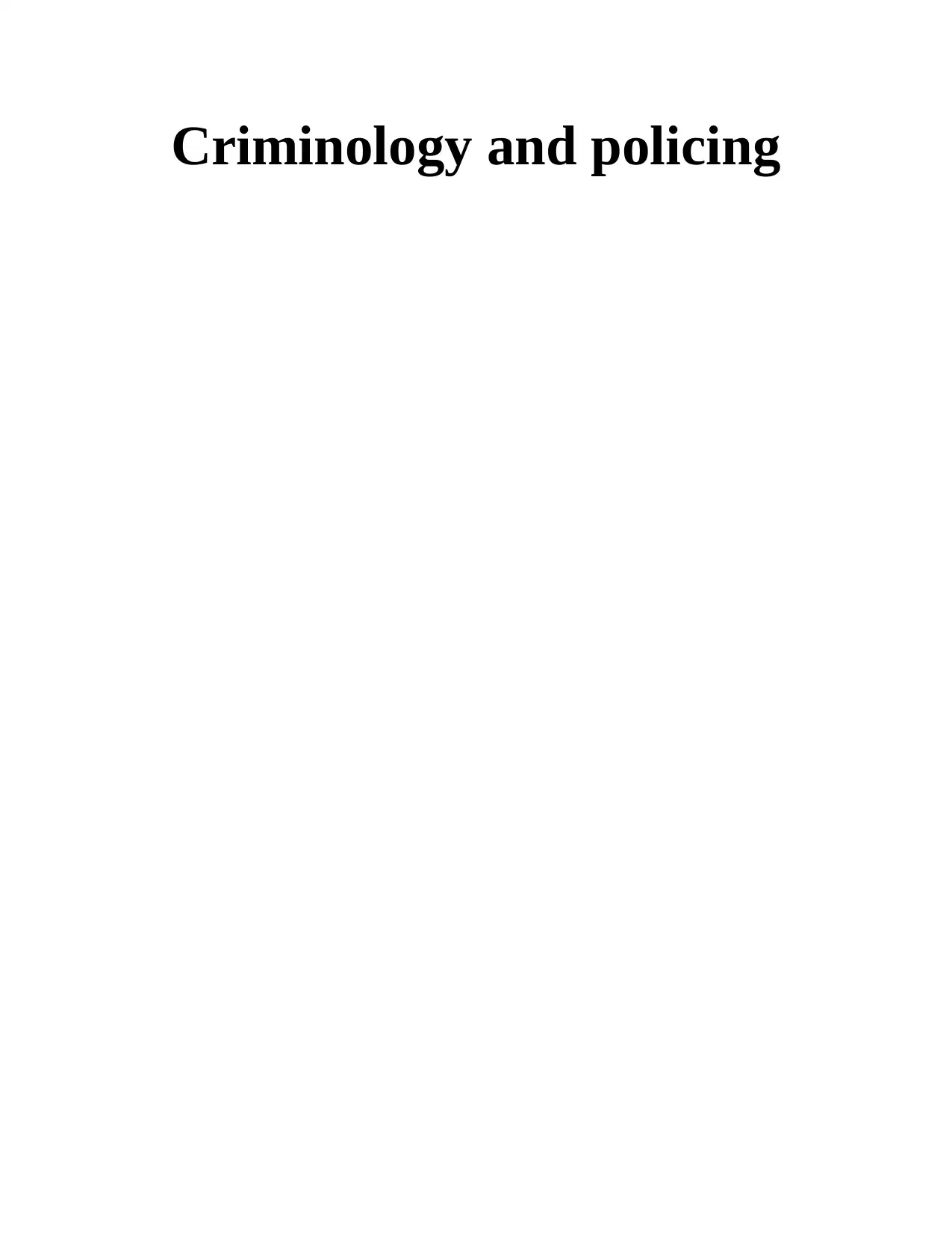
Criminology and policing
Paraphrase This Document
Need a fresh take? Get an instant paraphrase of this document with our AI Paraphraser

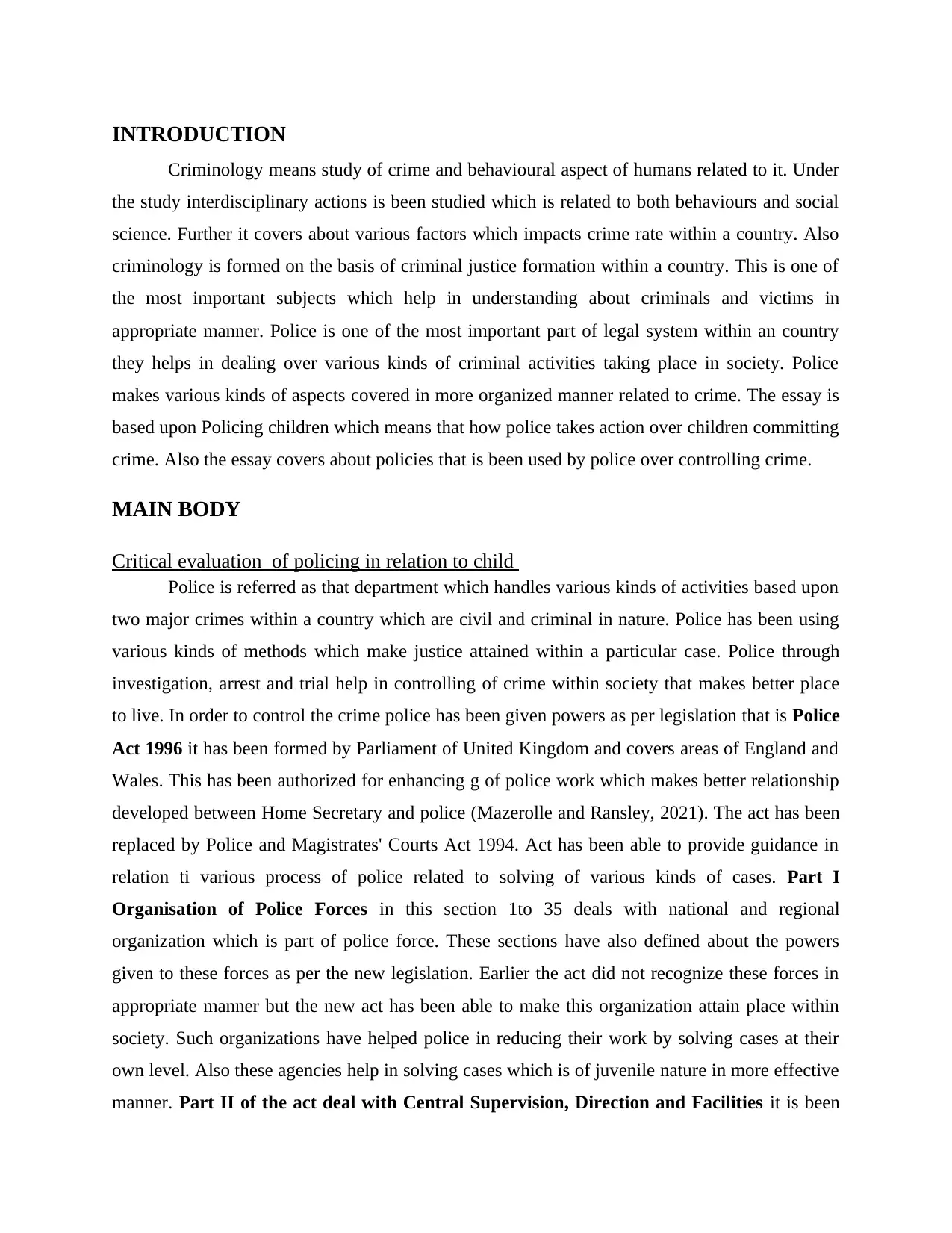
INTRODUCTION
Criminology means study of crime and behavioural aspect of humans related to it. Under
the study interdisciplinary actions is been studied which is related to both behaviours and social
science. Further it covers about various factors which impacts crime rate within a country. Also
criminology is formed on the basis of criminal justice formation within a country. This is one of
the most important subjects which help in understanding about criminals and victims in
appropriate manner. Police is one of the most important part of legal system within an country
they helps in dealing over various kinds of criminal activities taking place in society. Police
makes various kinds of aspects covered in more organized manner related to crime. The essay is
based upon Policing children which means that how police takes action over children committing
crime. Also the essay covers about policies that is been used by police over controlling crime.
MAIN BODY
Critical evaluation of policing in relation to child
Police is referred as that department which handles various kinds of activities based upon
two major crimes within a country which are civil and criminal in nature. Police has been using
various kinds of methods which make justice attained within a particular case. Police through
investigation, arrest and trial help in controlling of crime within society that makes better place
to live. In order to control the crime police has been given powers as per legislation that is Police
Act 1996 it has been formed by Parliament of United Kingdom and covers areas of England and
Wales. This has been authorized for enhancing g of police work which makes better relationship
developed between Home Secretary and police (Mazerolle and Ransley, 2021). The act has been
replaced by Police and Magistrates' Courts Act 1994. Act has been able to provide guidance in
relation ti various process of police related to solving of various kinds of cases. Part I
Organisation of Police Forces in this section 1to 35 deals with national and regional
organization which is part of police force. These sections have also defined about the powers
given to these forces as per the new legislation. Earlier the act did not recognize these forces in
appropriate manner but the new act has been able to make this organization attain place within
society. Such organizations have helped police in reducing their work by solving cases at their
own level. Also these agencies help in solving cases which is of juvenile nature in more effective
manner. Part II of the act deal with Central Supervision, Direction and Facilities it is been
Criminology means study of crime and behavioural aspect of humans related to it. Under
the study interdisciplinary actions is been studied which is related to both behaviours and social
science. Further it covers about various factors which impacts crime rate within a country. Also
criminology is formed on the basis of criminal justice formation within a country. This is one of
the most important subjects which help in understanding about criminals and victims in
appropriate manner. Police is one of the most important part of legal system within an country
they helps in dealing over various kinds of criminal activities taking place in society. Police
makes various kinds of aspects covered in more organized manner related to crime. The essay is
based upon Policing children which means that how police takes action over children committing
crime. Also the essay covers about policies that is been used by police over controlling crime.
MAIN BODY
Critical evaluation of policing in relation to child
Police is referred as that department which handles various kinds of activities based upon
two major crimes within a country which are civil and criminal in nature. Police has been using
various kinds of methods which make justice attained within a particular case. Police through
investigation, arrest and trial help in controlling of crime within society that makes better place
to live. In order to control the crime police has been given powers as per legislation that is Police
Act 1996 it has been formed by Parliament of United Kingdom and covers areas of England and
Wales. This has been authorized for enhancing g of police work which makes better relationship
developed between Home Secretary and police (Mazerolle and Ransley, 2021). The act has been
replaced by Police and Magistrates' Courts Act 1994. Act has been able to provide guidance in
relation ti various process of police related to solving of various kinds of cases. Part I
Organisation of Police Forces in this section 1to 35 deals with national and regional
organization which is part of police force. These sections have also defined about the powers
given to these forces as per the new legislation. Earlier the act did not recognize these forces in
appropriate manner but the new act has been able to make this organization attain place within
society. Such organizations have helped police in reducing their work by solving cases at their
own level. Also these agencies help in solving cases which is of juvenile nature in more effective
manner. Part II of the act deal with Central Supervision, Direction and Facilities it is been
⊘ This is a preview!⊘
Do you want full access?
Subscribe today to unlock all pages.

Trusted by 1+ million students worldwide
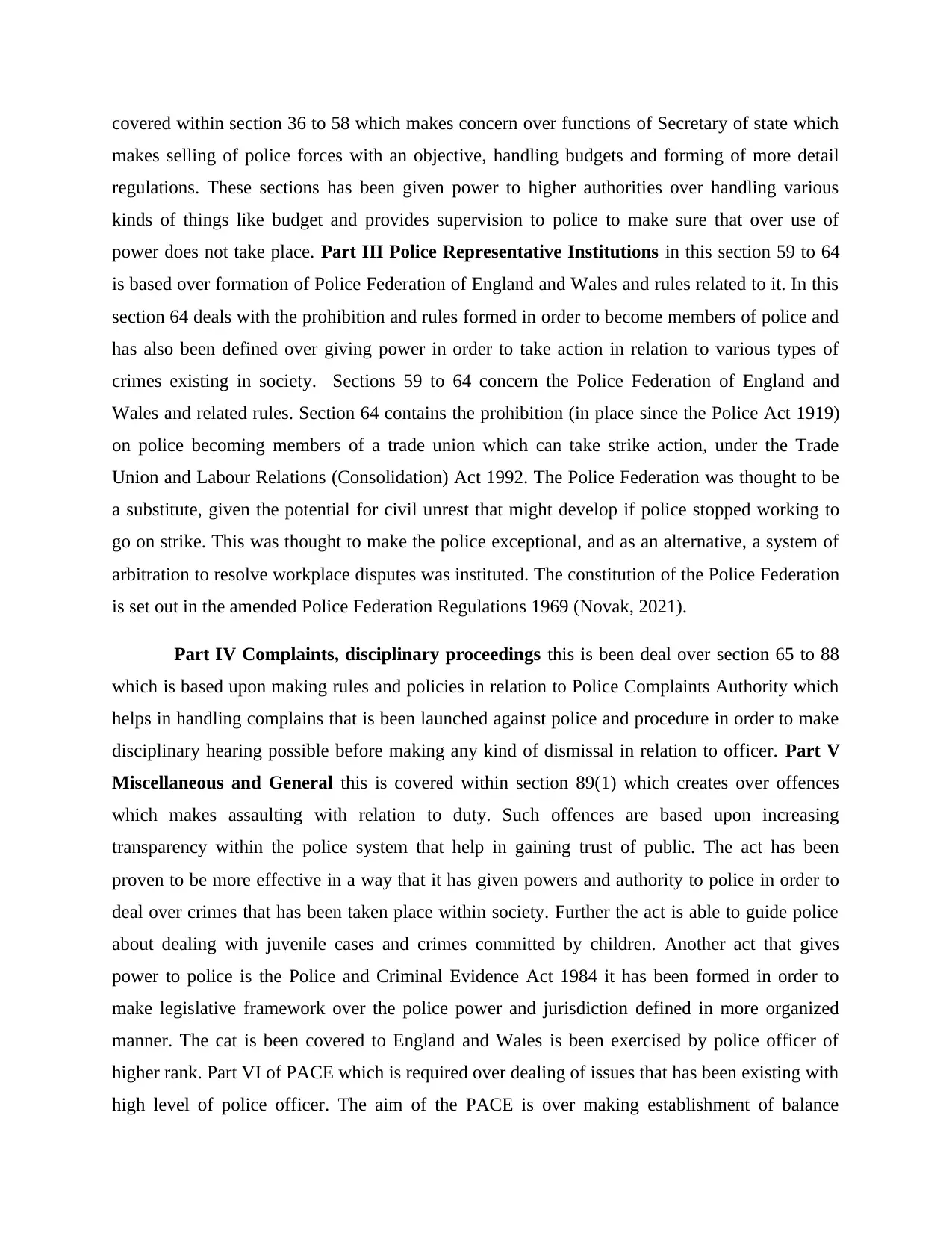
covered within section 36 to 58 which makes concern over functions of Secretary of state which
makes selling of police forces with an objective, handling budgets and forming of more detail
regulations. These sections has been given power to higher authorities over handling various
kinds of things like budget and provides supervision to police to make sure that over use of
power does not take place. Part III Police Representative Institutions in this section 59 to 64
is based over formation of Police Federation of England and Wales and rules related to it. In this
section 64 deals with the prohibition and rules formed in order to become members of police and
has also been defined over giving power in order to take action in relation to various types of
crimes existing in society. Sections 59 to 64 concern the Police Federation of England and
Wales and related rules. Section 64 contains the prohibition (in place since the Police Act 1919)
on police becoming members of a trade union which can take strike action, under the Trade
Union and Labour Relations (Consolidation) Act 1992. The Police Federation was thought to be
a substitute, given the potential for civil unrest that might develop if police stopped working to
go on strike. This was thought to make the police exceptional, and as an alternative, a system of
arbitration to resolve workplace disputes was instituted. The constitution of the Police Federation
is set out in the amended Police Federation Regulations 1969 (Novak, 2021).
Part IV Complaints, disciplinary proceedings this is been deal over section 65 to 88
which is based upon making rules and policies in relation to Police Complaints Authority which
helps in handling complains that is been launched against police and procedure in order to make
disciplinary hearing possible before making any kind of dismissal in relation to officer. Part V
Miscellaneous and General this is covered within section 89(1) which creates over offences
which makes assaulting with relation to duty. Such offences are based upon increasing
transparency within the police system that help in gaining trust of public. The act has been
proven to be more effective in a way that it has given powers and authority to police in order to
deal over crimes that has been taken place within society. Further the act is able to guide police
about dealing with juvenile cases and crimes committed by children. Another act that gives
power to police is the Police and Criminal Evidence Act 1984 it has been formed in order to
make legislative framework over the police power and jurisdiction defined in more organized
manner. The cat is been covered to England and Wales is been exercised by police officer of
higher rank. Part VI of PACE which is required over dealing of issues that has been existing with
high level of police officer. The aim of the PACE is over making establishment of balance
makes selling of police forces with an objective, handling budgets and forming of more detail
regulations. These sections has been given power to higher authorities over handling various
kinds of things like budget and provides supervision to police to make sure that over use of
power does not take place. Part III Police Representative Institutions in this section 59 to 64
is based over formation of Police Federation of England and Wales and rules related to it. In this
section 64 deals with the prohibition and rules formed in order to become members of police and
has also been defined over giving power in order to take action in relation to various types of
crimes existing in society. Sections 59 to 64 concern the Police Federation of England and
Wales and related rules. Section 64 contains the prohibition (in place since the Police Act 1919)
on police becoming members of a trade union which can take strike action, under the Trade
Union and Labour Relations (Consolidation) Act 1992. The Police Federation was thought to be
a substitute, given the potential for civil unrest that might develop if police stopped working to
go on strike. This was thought to make the police exceptional, and as an alternative, a system of
arbitration to resolve workplace disputes was instituted. The constitution of the Police Federation
is set out in the amended Police Federation Regulations 1969 (Novak, 2021).
Part IV Complaints, disciplinary proceedings this is been deal over section 65 to 88
which is based upon making rules and policies in relation to Police Complaints Authority which
helps in handling complains that is been launched against police and procedure in order to make
disciplinary hearing possible before making any kind of dismissal in relation to officer. Part V
Miscellaneous and General this is covered within section 89(1) which creates over offences
which makes assaulting with relation to duty. Such offences are based upon increasing
transparency within the police system that help in gaining trust of public. The act has been
proven to be more effective in a way that it has given powers and authority to police in order to
deal over crimes that has been taken place within society. Further the act is able to guide police
about dealing with juvenile cases and crimes committed by children. Another act that gives
power to police is the Police and Criminal Evidence Act 1984 it has been formed in order to
make legislative framework over the police power and jurisdiction defined in more organized
manner. The cat is been covered to England and Wales is been exercised by police officer of
higher rank. Part VI of PACE which is required over dealing of issues that has been existing with
high level of police officer. The aim of the PACE is over making establishment of balance
Paraphrase This Document
Need a fresh take? Get an instant paraphrase of this document with our AI Paraphraser
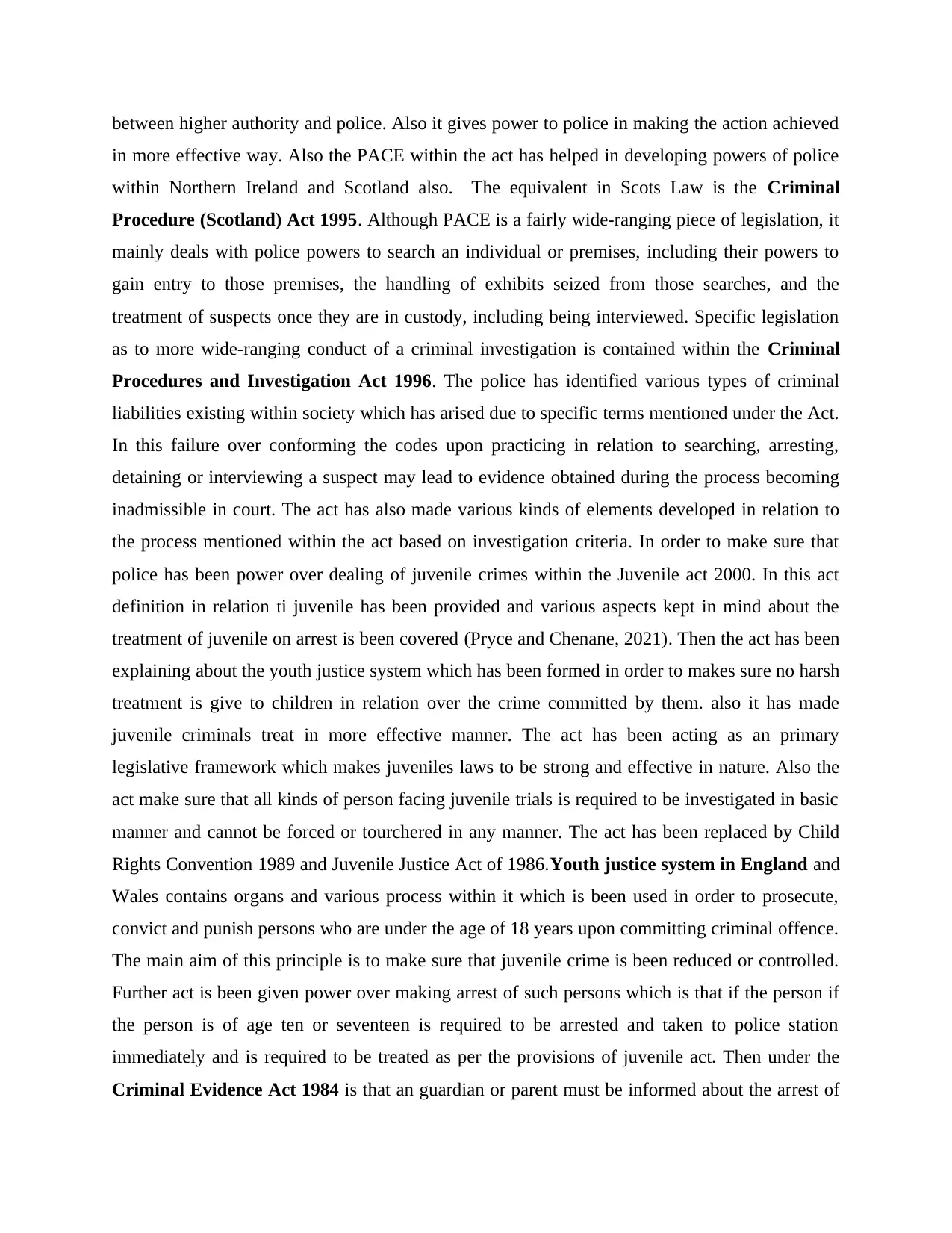
between higher authority and police. Also it gives power to police in making the action achieved
in more effective way. Also the PACE within the act has helped in developing powers of police
within Northern Ireland and Scotland also. The equivalent in Scots Law is the Criminal
Procedure (Scotland) Act 1995. Although PACE is a fairly wide-ranging piece of legislation, it
mainly deals with police powers to search an individual or premises, including their powers to
gain entry to those premises, the handling of exhibits seized from those searches, and the
treatment of suspects once they are in custody, including being interviewed. Specific legislation
as to more wide-ranging conduct of a criminal investigation is contained within the Criminal
Procedures and Investigation Act 1996. The police has identified various types of criminal
liabilities existing within society which has arised due to specific terms mentioned under the Act.
In this failure over conforming the codes upon practicing in relation to searching, arresting,
detaining or interviewing a suspect may lead to evidence obtained during the process becoming
inadmissible in court. The act has also made various kinds of elements developed in relation to
the process mentioned within the act based on investigation criteria. In order to make sure that
police has been power over dealing of juvenile crimes within the Juvenile act 2000. In this act
definition in relation ti juvenile has been provided and various aspects kept in mind about the
treatment of juvenile on arrest is been covered (Pryce and Chenane, 2021). Then the act has been
explaining about the youth justice system which has been formed in order to makes sure no harsh
treatment is give to children in relation over the crime committed by them. also it has made
juvenile criminals treat in more effective manner. The act has been acting as an primary
legislative framework which makes juveniles laws to be strong and effective in nature. Also the
act make sure that all kinds of person facing juvenile trials is required to be investigated in basic
manner and cannot be forced or tourchered in any manner. The act has been replaced by Child
Rights Convention 1989 and Juvenile Justice Act of 1986.Youth justice system in England and
Wales contains organs and various process within it which is been used in order to prosecute,
convict and punish persons who are under the age of 18 years upon committing criminal offence.
The main aim of this principle is to make sure that juvenile crime is been reduced or controlled.
Further act is been given power over making arrest of such persons which is that if the person if
the person is of age ten or seventeen is required to be arrested and taken to police station
immediately and is required to be treated as per the provisions of juvenile act. Then under the
Criminal Evidence Act 1984 is that an guardian or parent must be informed about the arrest of
in more effective way. Also the PACE within the act has helped in developing powers of police
within Northern Ireland and Scotland also. The equivalent in Scots Law is the Criminal
Procedure (Scotland) Act 1995. Although PACE is a fairly wide-ranging piece of legislation, it
mainly deals with police powers to search an individual or premises, including their powers to
gain entry to those premises, the handling of exhibits seized from those searches, and the
treatment of suspects once they are in custody, including being interviewed. Specific legislation
as to more wide-ranging conduct of a criminal investigation is contained within the Criminal
Procedures and Investigation Act 1996. The police has identified various types of criminal
liabilities existing within society which has arised due to specific terms mentioned under the Act.
In this failure over conforming the codes upon practicing in relation to searching, arresting,
detaining or interviewing a suspect may lead to evidence obtained during the process becoming
inadmissible in court. The act has also made various kinds of elements developed in relation to
the process mentioned within the act based on investigation criteria. In order to make sure that
police has been power over dealing of juvenile crimes within the Juvenile act 2000. In this act
definition in relation ti juvenile has been provided and various aspects kept in mind about the
treatment of juvenile on arrest is been covered (Pryce and Chenane, 2021). Then the act has been
explaining about the youth justice system which has been formed in order to makes sure no harsh
treatment is give to children in relation over the crime committed by them. also it has made
juvenile criminals treat in more effective manner. The act has been acting as an primary
legislative framework which makes juveniles laws to be strong and effective in nature. Also the
act make sure that all kinds of person facing juvenile trials is required to be investigated in basic
manner and cannot be forced or tourchered in any manner. The act has been replaced by Child
Rights Convention 1989 and Juvenile Justice Act of 1986.Youth justice system in England and
Wales contains organs and various process within it which is been used in order to prosecute,
convict and punish persons who are under the age of 18 years upon committing criminal offence.
The main aim of this principle is to make sure that juvenile crime is been reduced or controlled.
Further act is been given power over making arrest of such persons which is that if the person if
the person is of age ten or seventeen is required to be arrested and taken to police station
immediately and is required to be treated as per the provisions of juvenile act. Then under the
Criminal Evidence Act 1984 is that an guardian or parent must be informed about the arrest of
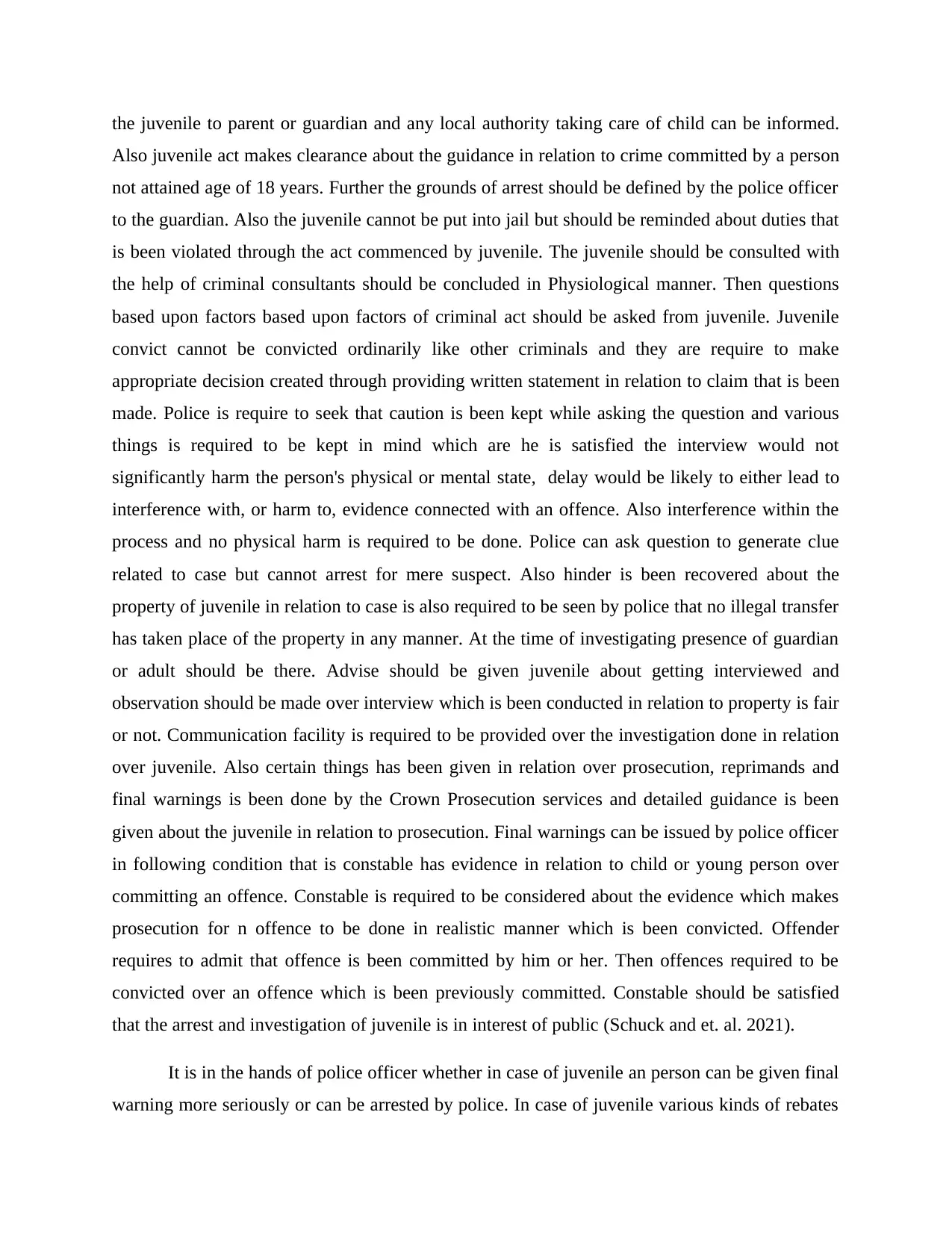
the juvenile to parent or guardian and any local authority taking care of child can be informed.
Also juvenile act makes clearance about the guidance in relation to crime committed by a person
not attained age of 18 years. Further the grounds of arrest should be defined by the police officer
to the guardian. Also the juvenile cannot be put into jail but should be reminded about duties that
is been violated through the act commenced by juvenile. The juvenile should be consulted with
the help of criminal consultants should be concluded in Physiological manner. Then questions
based upon factors based upon factors of criminal act should be asked from juvenile. Juvenile
convict cannot be convicted ordinarily like other criminals and they are require to make
appropriate decision created through providing written statement in relation to claim that is been
made. Police is require to seek that caution is been kept while asking the question and various
things is required to be kept in mind which are he is satisfied the interview would not
significantly harm the person's physical or mental state, delay would be likely to either lead to
interference with, or harm to, evidence connected with an offence. Also interference within the
process and no physical harm is required to be done. Police can ask question to generate clue
related to case but cannot arrest for mere suspect. Also hinder is been recovered about the
property of juvenile in relation to case is also required to be seen by police that no illegal transfer
has taken place of the property in any manner. At the time of investigating presence of guardian
or adult should be there. Advise should be given juvenile about getting interviewed and
observation should be made over interview which is been conducted in relation to property is fair
or not. Communication facility is required to be provided over the investigation done in relation
over juvenile. Also certain things has been given in relation over prosecution, reprimands and
final warnings is been done by the Crown Prosecution services and detailed guidance is been
given about the juvenile in relation to prosecution. Final warnings can be issued by police officer
in following condition that is constable has evidence in relation to child or young person over
committing an offence. Constable is required to be considered about the evidence which makes
prosecution for n offence to be done in realistic manner which is been convicted. Offender
requires to admit that offence is been committed by him or her. Then offences required to be
convicted over an offence which is been previously committed. Constable should be satisfied
that the arrest and investigation of juvenile is in interest of public (Schuck and et. al. 2021).
It is in the hands of police officer whether in case of juvenile an person can be given final
warning more seriously or can be arrested by police. In case of juvenile various kinds of rebates
Also juvenile act makes clearance about the guidance in relation to crime committed by a person
not attained age of 18 years. Further the grounds of arrest should be defined by the police officer
to the guardian. Also the juvenile cannot be put into jail but should be reminded about duties that
is been violated through the act commenced by juvenile. The juvenile should be consulted with
the help of criminal consultants should be concluded in Physiological manner. Then questions
based upon factors based upon factors of criminal act should be asked from juvenile. Juvenile
convict cannot be convicted ordinarily like other criminals and they are require to make
appropriate decision created through providing written statement in relation to claim that is been
made. Police is require to seek that caution is been kept while asking the question and various
things is required to be kept in mind which are he is satisfied the interview would not
significantly harm the person's physical or mental state, delay would be likely to either lead to
interference with, or harm to, evidence connected with an offence. Also interference within the
process and no physical harm is required to be done. Police can ask question to generate clue
related to case but cannot arrest for mere suspect. Also hinder is been recovered about the
property of juvenile in relation to case is also required to be seen by police that no illegal transfer
has taken place of the property in any manner. At the time of investigating presence of guardian
or adult should be there. Advise should be given juvenile about getting interviewed and
observation should be made over interview which is been conducted in relation to property is fair
or not. Communication facility is required to be provided over the investigation done in relation
over juvenile. Also certain things has been given in relation over prosecution, reprimands and
final warnings is been done by the Crown Prosecution services and detailed guidance is been
given about the juvenile in relation to prosecution. Final warnings can be issued by police officer
in following condition that is constable has evidence in relation to child or young person over
committing an offence. Constable is required to be considered about the evidence which makes
prosecution for n offence to be done in realistic manner which is been convicted. Offender
requires to admit that offence is been committed by him or her. Then offences required to be
convicted over an offence which is been previously committed. Constable should be satisfied
that the arrest and investigation of juvenile is in interest of public (Schuck and et. al. 2021).
It is in the hands of police officer whether in case of juvenile an person can be given final
warning more seriously or can be arrested by police. In case of juvenile various kinds of rebates
⊘ This is a preview!⊘
Do you want full access?
Subscribe today to unlock all pages.

Trusted by 1+ million students worldwide
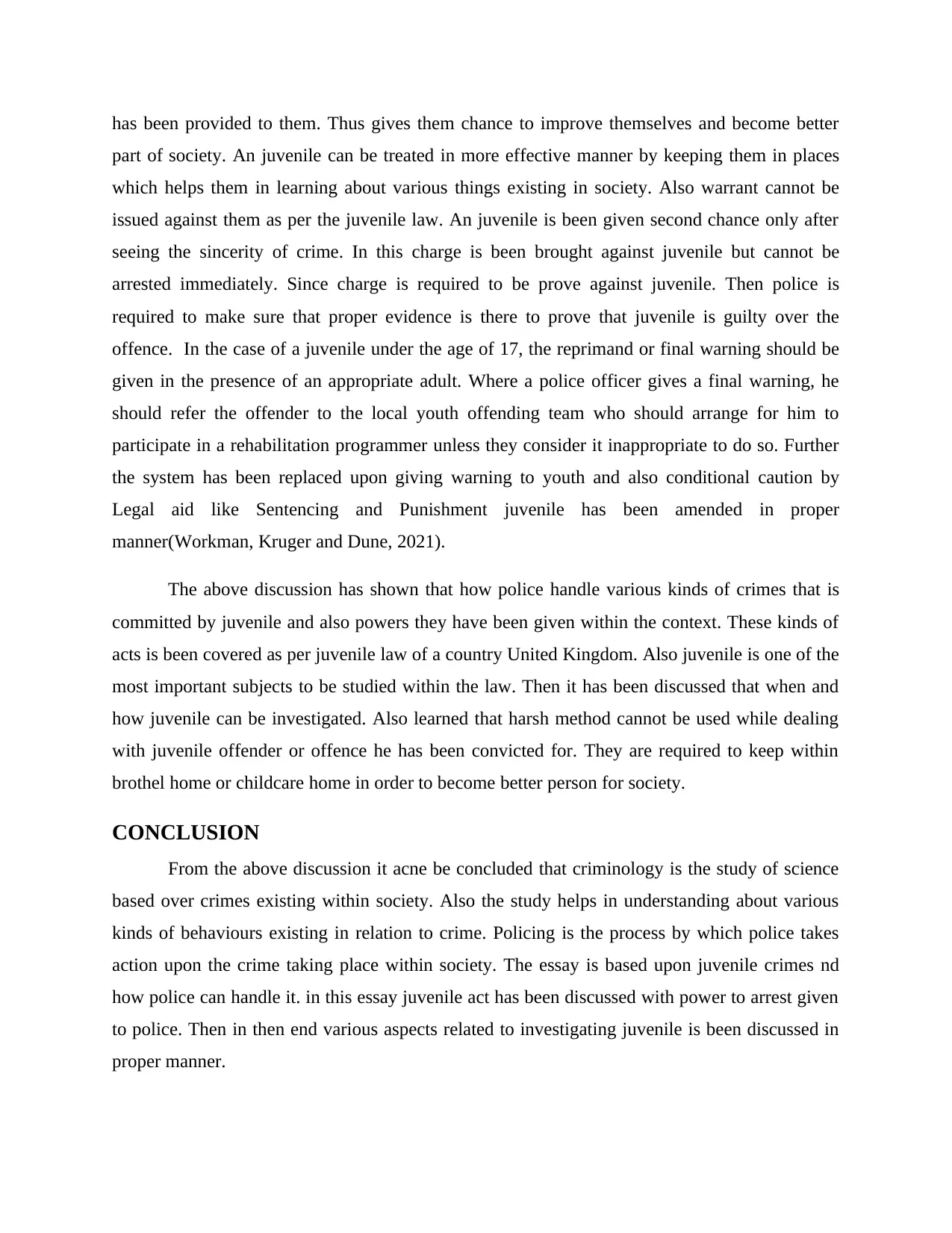
has been provided to them. Thus gives them chance to improve themselves and become better
part of society. An juvenile can be treated in more effective manner by keeping them in places
which helps them in learning about various things existing in society. Also warrant cannot be
issued against them as per the juvenile law. An juvenile is been given second chance only after
seeing the sincerity of crime. In this charge is been brought against juvenile but cannot be
arrested immediately. Since charge is required to be prove against juvenile. Then police is
required to make sure that proper evidence is there to prove that juvenile is guilty over the
offence. In the case of a juvenile under the age of 17, the reprimand or final warning should be
given in the presence of an appropriate adult. Where a police officer gives a final warning, he
should refer the offender to the local youth offending team who should arrange for him to
participate in a rehabilitation programmer unless they consider it inappropriate to do so. Further
the system has been replaced upon giving warning to youth and also conditional caution by
Legal aid like Sentencing and Punishment juvenile has been amended in proper
manner(Workman, Kruger and Dune, 2021).
The above discussion has shown that how police handle various kinds of crimes that is
committed by juvenile and also powers they have been given within the context. These kinds of
acts is been covered as per juvenile law of a country United Kingdom. Also juvenile is one of the
most important subjects to be studied within the law. Then it has been discussed that when and
how juvenile can be investigated. Also learned that harsh method cannot be used while dealing
with juvenile offender or offence he has been convicted for. They are required to keep within
brothel home or childcare home in order to become better person for society.
CONCLUSION
From the above discussion it acne be concluded that criminology is the study of science
based over crimes existing within society. Also the study helps in understanding about various
kinds of behaviours existing in relation to crime. Policing is the process by which police takes
action upon the crime taking place within society. The essay is based upon juvenile crimes nd
how police can handle it. in this essay juvenile act has been discussed with power to arrest given
to police. Then in then end various aspects related to investigating juvenile is been discussed in
proper manner.
part of society. An juvenile can be treated in more effective manner by keeping them in places
which helps them in learning about various things existing in society. Also warrant cannot be
issued against them as per the juvenile law. An juvenile is been given second chance only after
seeing the sincerity of crime. In this charge is been brought against juvenile but cannot be
arrested immediately. Since charge is required to be prove against juvenile. Then police is
required to make sure that proper evidence is there to prove that juvenile is guilty over the
offence. In the case of a juvenile under the age of 17, the reprimand or final warning should be
given in the presence of an appropriate adult. Where a police officer gives a final warning, he
should refer the offender to the local youth offending team who should arrange for him to
participate in a rehabilitation programmer unless they consider it inappropriate to do so. Further
the system has been replaced upon giving warning to youth and also conditional caution by
Legal aid like Sentencing and Punishment juvenile has been amended in proper
manner(Workman, Kruger and Dune, 2021).
The above discussion has shown that how police handle various kinds of crimes that is
committed by juvenile and also powers they have been given within the context. These kinds of
acts is been covered as per juvenile law of a country United Kingdom. Also juvenile is one of the
most important subjects to be studied within the law. Then it has been discussed that when and
how juvenile can be investigated. Also learned that harsh method cannot be used while dealing
with juvenile offender or offence he has been convicted for. They are required to keep within
brothel home or childcare home in order to become better person for society.
CONCLUSION
From the above discussion it acne be concluded that criminology is the study of science
based over crimes existing within society. Also the study helps in understanding about various
kinds of behaviours existing in relation to crime. Policing is the process by which police takes
action upon the crime taking place within society. The essay is based upon juvenile crimes nd
how police can handle it. in this essay juvenile act has been discussed with power to arrest given
to police. Then in then end various aspects related to investigating juvenile is been discussed in
proper manner.
Paraphrase This Document
Need a fresh take? Get an instant paraphrase of this document with our AI Paraphraser
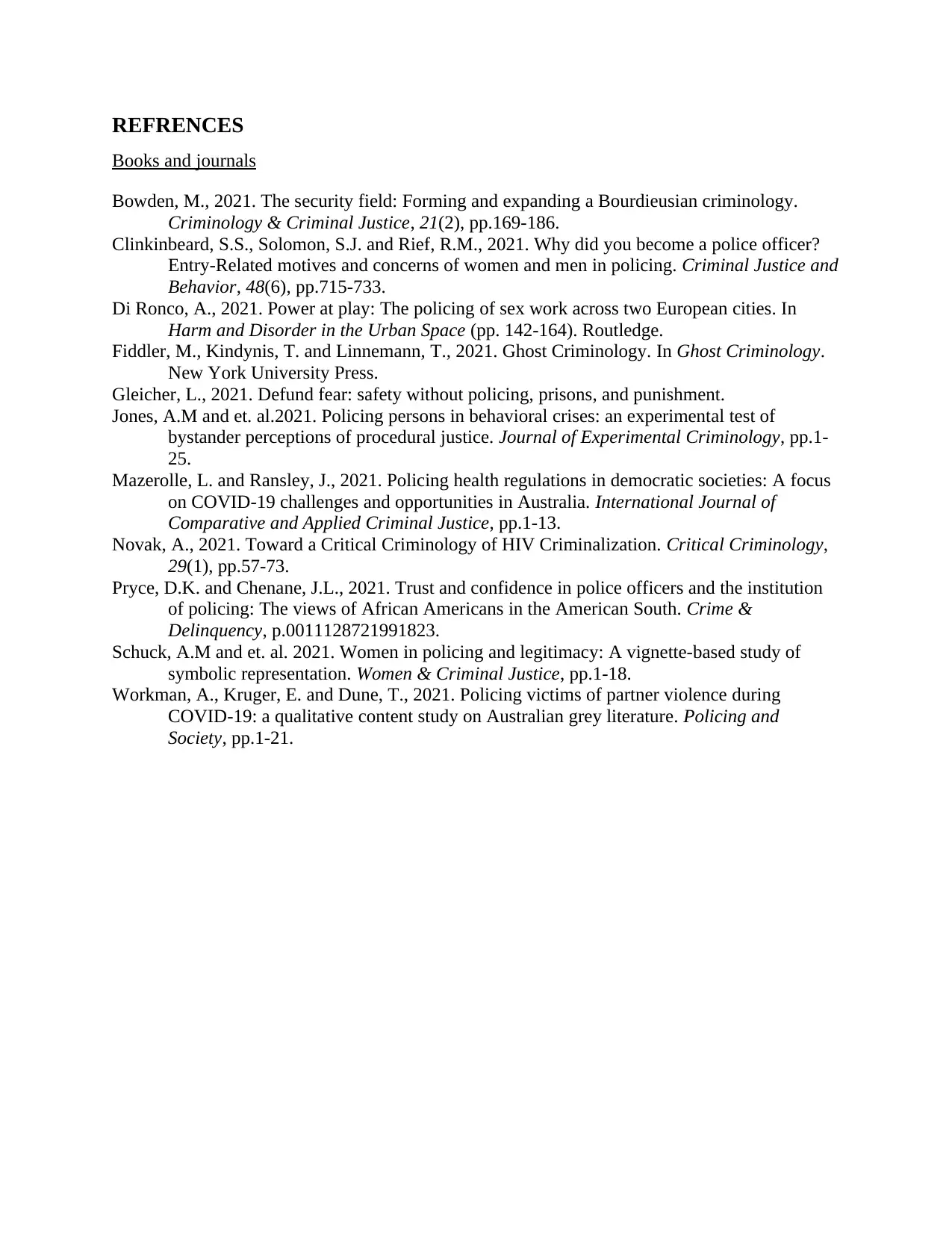
REFRENCES
Books and journals
Bowden, M., 2021. The security field: Forming and expanding a Bourdieusian criminology.
Criminology & Criminal Justice, 21(2), pp.169-186.
Clinkinbeard, S.S., Solomon, S.J. and Rief, R.M., 2021. Why did you become a police officer?
Entry-Related motives and concerns of women and men in policing. Criminal Justice and
Behavior, 48(6), pp.715-733.
Di Ronco, A., 2021. Power at play: The policing of sex work across two European cities. In
Harm and Disorder in the Urban Space (pp. 142-164). Routledge.
Fiddler, M., Kindynis, T. and Linnemann, T., 2021. Ghost Criminology. In Ghost Criminology.
New York University Press.
Gleicher, L., 2021. Defund fear: safety without policing, prisons, and punishment.
Jones, A.M and et. al.2021. Policing persons in behavioral crises: an experimental test of
bystander perceptions of procedural justice. Journal of Experimental Criminology, pp.1-
25.
Mazerolle, L. and Ransley, J., 2021. Policing health regulations in democratic societies: A focus
on COVID-19 challenges and opportunities in Australia. International Journal of
Comparative and Applied Criminal Justice, pp.1-13.
Novak, A., 2021. Toward a Critical Criminology of HIV Criminalization. Critical Criminology,
29(1), pp.57-73.
Pryce, D.K. and Chenane, J.L., 2021. Trust and confidence in police officers and the institution
of policing: The views of African Americans in the American South. Crime &
Delinquency, p.0011128721991823.
Schuck, A.M and et. al. 2021. Women in policing and legitimacy: A vignette-based study of
symbolic representation. Women & Criminal Justice, pp.1-18.
Workman, A., Kruger, E. and Dune, T., 2021. Policing victims of partner violence during
COVID-19: a qualitative content study on Australian grey literature. Policing and
Society, pp.1-21.
Books and journals
Bowden, M., 2021. The security field: Forming and expanding a Bourdieusian criminology.
Criminology & Criminal Justice, 21(2), pp.169-186.
Clinkinbeard, S.S., Solomon, S.J. and Rief, R.M., 2021. Why did you become a police officer?
Entry-Related motives and concerns of women and men in policing. Criminal Justice and
Behavior, 48(6), pp.715-733.
Di Ronco, A., 2021. Power at play: The policing of sex work across two European cities. In
Harm and Disorder in the Urban Space (pp. 142-164). Routledge.
Fiddler, M., Kindynis, T. and Linnemann, T., 2021. Ghost Criminology. In Ghost Criminology.
New York University Press.
Gleicher, L., 2021. Defund fear: safety without policing, prisons, and punishment.
Jones, A.M and et. al.2021. Policing persons in behavioral crises: an experimental test of
bystander perceptions of procedural justice. Journal of Experimental Criminology, pp.1-
25.
Mazerolle, L. and Ransley, J., 2021. Policing health regulations in democratic societies: A focus
on COVID-19 challenges and opportunities in Australia. International Journal of
Comparative and Applied Criminal Justice, pp.1-13.
Novak, A., 2021. Toward a Critical Criminology of HIV Criminalization. Critical Criminology,
29(1), pp.57-73.
Pryce, D.K. and Chenane, J.L., 2021. Trust and confidence in police officers and the institution
of policing: The views of African Americans in the American South. Crime &
Delinquency, p.0011128721991823.
Schuck, A.M and et. al. 2021. Women in policing and legitimacy: A vignette-based study of
symbolic representation. Women & Criminal Justice, pp.1-18.
Workman, A., Kruger, E. and Dune, T., 2021. Policing victims of partner violence during
COVID-19: a qualitative content study on Australian grey literature. Policing and
Society, pp.1-21.
1 out of 8
Related Documents
Your All-in-One AI-Powered Toolkit for Academic Success.
+13062052269
info@desklib.com
Available 24*7 on WhatsApp / Email
![[object Object]](/_next/static/media/star-bottom.7253800d.svg)
Unlock your academic potential
Copyright © 2020–2026 A2Z Services. All Rights Reserved. Developed and managed by ZUCOL.





